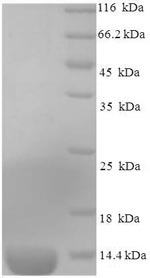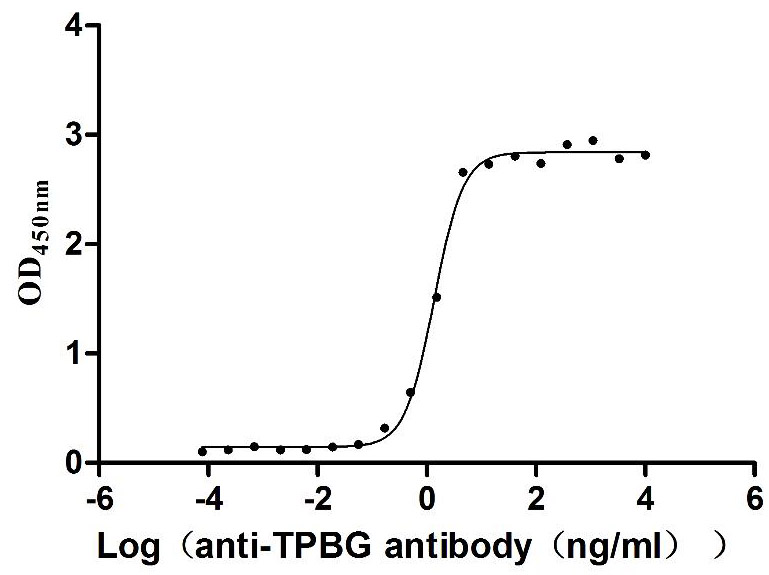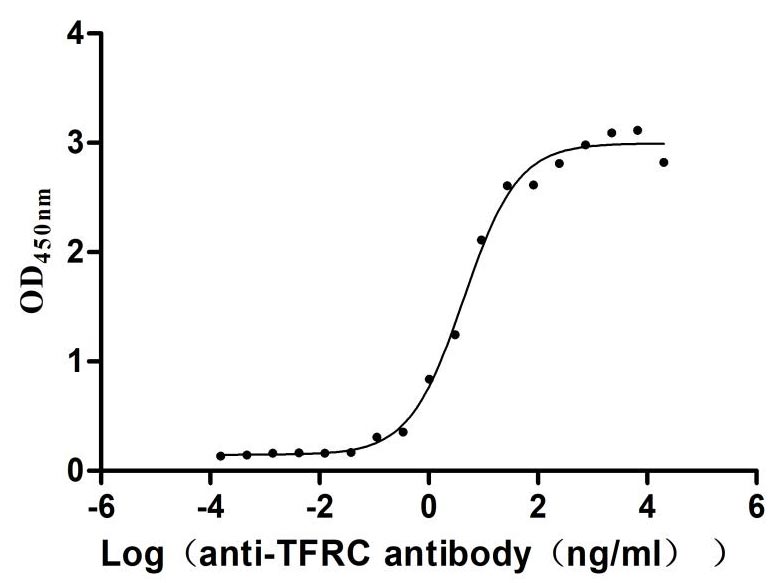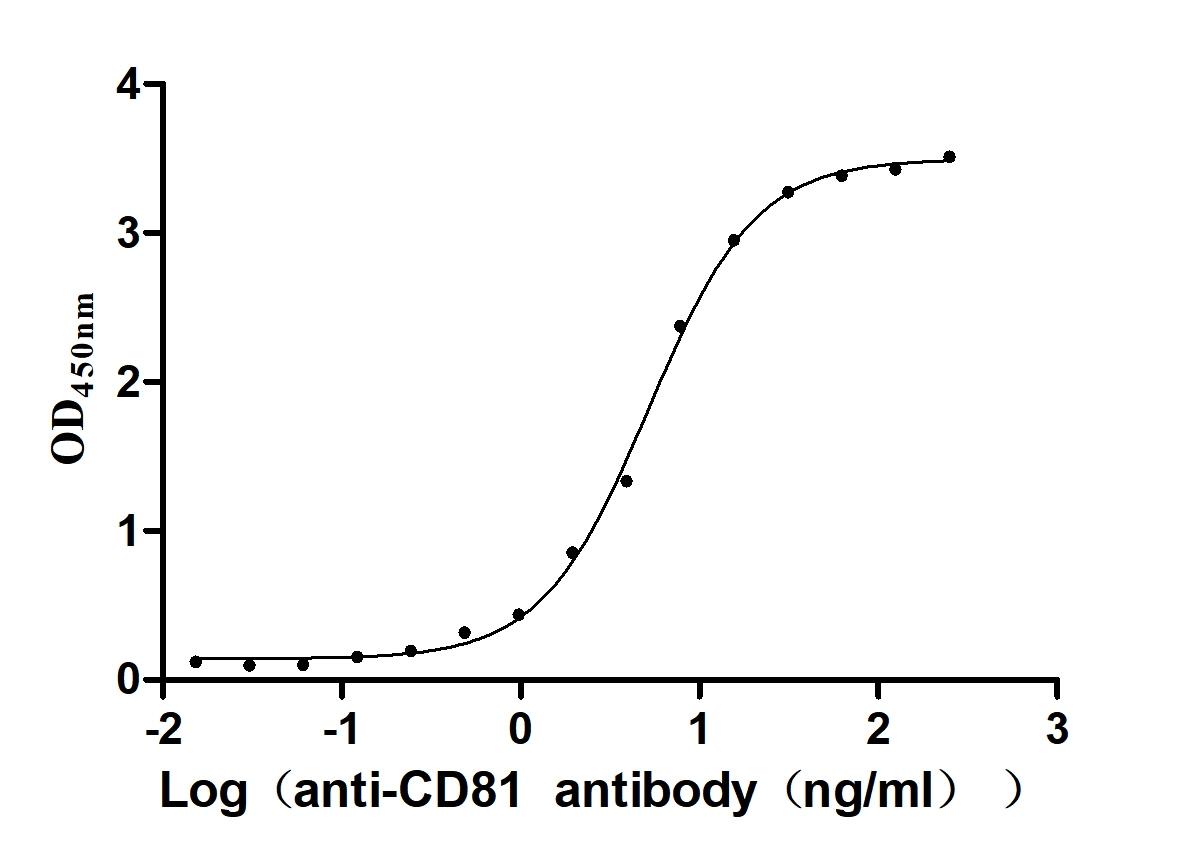Recombinant Mouse C-C motif chemokine 2 (Ccl2), partial
In Stock-
货号:CSB-EP004783MO
-
规格:¥1836
-
图片:
-
其他:
产品详情
-
纯度:Greater than 90% as determined by SDS-PAGE.
-
基因名:
-
Uniprot No.:
-
别名:Ccl2; Je; Mcp1; Scya2; C-C motif chemokine 2; Monocyte chemoattractant protein 1; Monocyte chemotactic protein 1; MCP-1; Platelet-derived growth factor-inducible protein JE; Small-inducible cytokine A2
-
种属:Mus musculus (Mouse)
-
蛋白长度:Partial
-
来源:E.coli
-
分子量:12.4kDa
-
表达区域:24-96aa
-
氨基酸序列QPDAINAPVTCCYNFTNRKISVQRLASYRRITSSKCPKEAVIFKTIVAKEICADPKQKWVQDSMDHLDKQTQT
Note: The complete sequence including tag sequence, target protein sequence and linker sequence could be provided upon request. -
蛋白标签:N-terminal 6xHis-tagged
-
产品提供形式:Liquid or Lyophilized powder
Note: We will preferentially ship the format that we have in stock, however, if you have any special requirement for the format, please remark your requirement when placing the order, we will prepare according to your demand. -
缓冲液:Tris-based buffer,50% glycerol
-
储存条件:Store at -20°C/-80°C upon receipt, aliquoting is necessary for mutiple use. Avoid repeated freeze-thaw cycles.
-
保质期:The shelf life is related to many factors, storage state, buffer ingredients, storage temperature and the stability of the protein itself.
Generally, the shelf life of liquid form is 6 months at -20°C/-80°C. The shelf life of lyophilized form is 12 months at -20°C/-80°C. -
货期:3-7 business days
-
注意事项:Repeated freezing and thawing is not recommended. Store working aliquots at 4°C for up to one week.
-
Datasheet & COA:Please contact us to get it.
相关产品
靶点详情
-
功能:Acts as a ligand for C-C chemokine receptor CCR2. Signals through binding and activation of CCR2 and induces a strong chemotactic response and mobilization of intracellular calcium ions. Exhibits a chemotactic activity for monocytes and basophils but not neutrophils or eosinophils. Plays an important role in mediating peripheral nerve injury-induced neuropathic pain. Increases NMDA-mediated synaptic transmission in both dopamine D1 and D2 receptor-containing neurons, which may be caused by MAPK/ERK-dependent phosphorylation of GRIN2B/NMDAR2B.
-
基因功能参考文献:
- Targeting a reduction of MCP-1 opens the door to a better understanding of the mechanistic consequences of ceramide accumulation. PMID: 29379059
- CCL2 played important roles in regulating platelet function and arterial thrombosis through the PKCalpha-P38MAPK-HSP27 pathway. PMID: 29864522
- these results suggested that the IL-1beta-induced recruitment of monocyte/macrophage lineage cells to inflamed synovial membranes in TMJ was further augmented by the cell-cell interaction-induced secretion of MCP-1 from the inflammation site, possibly resulting in prolonged inflammatory responses in TMJ synovial tissue. PMID: 29535277
- NOX4 is induced in early alcoholic liver injury and regulates CCR2/CCL2 mRNA stability thereby promoting recruitment of inflammatory cells and production of proinflammatory cytokines. PMID: 28383062
- Ccl2-Ccr2 signaling recruits a distinct fetal microchimeric population that rescues delayed maternal wound healing. PMID: 28516946
- itration reduced the potential of CCL2 to stimulate monocyte migration in diffusion gradient chemotaxis assays (p < 0.05). This was consistent with a trend towards reduced affinity of the nitrated chemokine for its cognate receptor CCR2b. PMID: 28290520
- CCL2 enables the prolonged Mesenchymal stem cells-T cell interactions needed for sufficient suppression of autoreactive T cells PMID: 28117437
- The data highlight Klf4 as an essential MCPIP1-dependent modulator of innate immunity that protects against excessive and self-destructive inflammation. PMID: 29975947
- a novel mechanism that contributes to the EMT and metastatic phenotype observed in a subset of ADT-resistant prostate cancer, where the CCL2 is stimulated through the inactivated of AR-mediated SPDEF. PMID: 29477409
- Macrophage subtypes enhanced the osteogenesis in transwell setting and the transition from M1 to M2 was associated with an increase in bone anabolic factors CCL2/MCP-1, CCL5/RANTES and IGF-1 in vitro. PMID: 28782174
- Axotomy Leads to Reduced Calcium Increase and Earlier Termination of CCL2 Release in Spinal Motoneurons. PMID: 28017131
- Our results showed that MIF regulates MCP-1 expression in hepatocytes of injured liver via CD74, CD44, and p38 MAPK in an autocrine manner. PMID: 27273604
- these studies identify a novel role for the microbiota in shaping immunity, which includes induction of CCL2 levels that control homeostatic trafficking of plasmacytoid dendritic cells PMID: 27827374
- These studies show that elevated levels of CCL2 in the CNS through increased astrocyte expression can significantly interact with the behavioral effects of alcohol. PMID: 28431906
- Topical application of glycolic acid suppresses the UVB induced IL-6, IL-8, MCP-1 and COX-2 inflammation by modulating NF-kappaB signaling pathway in mouse skin. PMID: 28330776
- Study demonstrated that CD36 deletion regulated MCP-1 expression at the transcriptional level by changing the acetylation of histones binding to the MCP-1 promoters in hepatocytes, promoting macrophage migration to the liver, and aggravating hepatic inflammatory response and fibrosis. PMID: 27967209
- Despite higher caloric intake and elevated body weights, carbohydrate restriction lowered serum MCP-1 levels, reduced prostate macrophage infiltration, reduced prostate weight, but failed to slow adenocarcinoma development. PMID: 28244492
- Data indicate that ASC-J9(R) can suppress CD4+ T cell migration via decreasing the cytokine CCL2 in vitro and in vivo. PMID: 27564257
- PDAC responds to radiotherapy by producing CCL2, which recruits Ly6C(+)CCR2(+) monocytes to support tumor proliferation and neovascularization after radiotherapy. PMID: 27354473
- Chemokine receptor 2 (CCR2(+)) monocytes invade the hippocampus between 1 and 3 d after SE. In contrast, only an occasional CD3(+) T lymphocyte was encountered 3 d after SE. The initial cellular sources of the chemokine CCL2, a ligand for CCR2, included perivascular macrophages and microglia. The induction of the proinflammatory cytokine IL-1beta was greater in FACS-isolated microglia than in brain-invading monocytes PMID: 27601660
- data suggest that MCP-1 may be a necessary component of the inflammatory response required for adipose tissue protection, remodeling and healthy expansion in the FVB/N strain in response to high-fat diet feedings PMID: 26620890
- MCP-1 knockout mice exposed for voluntary wheel running displayed changes in brain cytokine expression and glial activation. PMID: 28088610
- Carvedilol treatment also significantly reduced the levels of proinflammatory cytokines tumor necrosis factor (TNF)-alpha, interleukin (IL)-1beta, IL-6, transforming growth factor (TGF)-beta1 and monocyte chemoattractant protein (MCP)-1 in the lung tissue. PMID: 27619518
- High dilutions of antimony modulate cytokines production and macrophage - Leishmania (L.) amazonensis interaction in vitro.( PMID: 28092793
- Both IL-6 protein production and transcript levels were downregulated by RA in respiratory tract epithelial cells (LETs) , but upregulated in macrophages (MACs). RA also increased transcript levels of MCP-1, GMCSF, and IL-10 in MACs, but not in LETs. Conversely, when LETs, but not MACs, were exposed to RA PMID: 27940088
- FSAP deficiency causes an increase in CCL2 expression and CCL2-mediated infiltration of leukocytes into the injured vessel PMID: 27431088
- miR-33 suppresses CCL2 expression via targeting at the 3'UTR. The miR-33/CCL2 axis in chondrocytes regulates the monocyte chemotaxis. PMID: 27129293
- Sca-1(+) progenitor cells found to exhibit increased migration was associated with elevated levels of chemokines, CCL2 (chemokine (C-C motif) ligand 2) and CXCL1 (chemokine (C-X-C motif) ligand 1), and their corresponding receptors. PMID: 27300479
- that MCP-1 inhibition restores glomerular endothelial glycocalyx and barrier function and reduces tissue inflammation in the presence of ongoing diabetic injury PMID: 28837800
- In LLC-bearing mice, the high-fat diet increased and MCP-1 deficiency decreased plasma TRAP 5b; neither the high-fat diet nor MCP-1 deficiency resulted in significant changes in plasma concentration of osteocalcin. PMID: 28177896
- Grooved surfaces showed time-dependent increase in soluble mediators involved in cell fusion, CCL2 and MMP-9 PMID: 27102570
- In this study, the effect of continuous IL-4 delivery or bioactive implant coating that constitutively releases a protein inhibitor of CCL2 signaling (7ND) on particle induced osteolysis were studied in the murine continuous femoral intramedullary particle infusion model PMID: 27114284
- Blockade of MCP-1 activity significantly reduced inflammatory pleural effusion formation in a CAR model PMID: 27878909
- CCL2 recruits T cells into the brain in a CCR2-independent manner. PMID: 28836736
- Expression of MCP-1 induced by IL-17 requires NF-kappaB through the phosphorylation of p65 in cardiac myocytes. PMID: 28593659
- this study demonstrates that killed probiotics can reduce viral disease severity and identify that the MCP-1 pathway might act as a key mediator in the improved antiviral immune response PMID: 27072606
- tumor-promoting role for CCL2 acting through CCR2 on the tumor microenvironment PMID: 27820834
- type I interferons, besides their known antiviral properties, can initiate the recruitment and activation of leukocytes via induction of chemokine expression including CCL2. PMID: 26992431
- In cultured macrophages, LPS-induced expression of monocyte chemoattractant protein (MCP)-1 was suppressed by NaN3 through inhibition of STAT1 and IkappaBzeta activities. PMID: 28391993
- study concludes that CCL2 signaling onto melanin-concentrating hormone neurons represents a core mechanism that relays peripheral inflammation to sickness behavior PMID: 27733491
- The increased migratory phenotypes are dependent on secreted factors, including the cytokine interleukin-6 and the chemokine CCL2. We propose that Delta122p53 (and Delta133p53) acts in a similar manner to 'gain-of-function' mutant p53 proteins to promote migration, invasion and metastasis, which may contribute to poor survival in patients with Delta133p53-expressing tumours PMID: 26996665
- CCL5 paradoxically limits macrophage accumulation in the injured kidney during renin angiotensin system (RAS) activation by constraining the proinflammatory actions of CCL2. PMID: 27640148
- This study establishes ECL1i as the first allosteric inhibitor of CCR2 with functional selectivity. PMID: 26979087
- Constitutive expression of CCL2 by the mouse mammary epithelium induces a state of low level chronic inflammation that increases stromal density and elevates cancer risk. We propose that CCL2-driven inflammation contributes to the increased risk of breast cancer observed in women with high mammographic density. PMID: 28077158
- the individual and combined actions of CCL2/CCR2 and CX3CL1/CX3CR1 in hypoxia-induced pulmonary hypertension in mice, is reported. PMID: 28125278
- CCL2 acting at the suprachiasmatic nuclei level is important for the circadian effects of immune activation. PMID: 27178133
- FAP-STAT3-CCL2 signaling in Cancer-associated fibroblasts (CAF) was sufficient to program an inflammatory component of the tumor microenvironment, which may have particular significance in desmoplasia-associated cancers. PMID: 27216177
- Macrophages induce neural stem cells migrating into the spinal cord injury site possibly through promoting the secretion of MCP-1. PMID: 27609570
- this study shows that CCL2 supports the classical activation of macrophages, with miR-9 mediated down-regulation of Dusp6 and enhanced ERK-mediated signal transduction possibly mediating this enhanced pro-inflammatory gene expression PMID: 28242024
- macrophage-specific chemokine (C-C Motif) receptor 2 (Ccr2) knockout (M-Ccr2KO) and intestinal epithelial cell-specific tamoxifen-inducible Ccl2 knockout (Vil-Ccl2KO) mice, were studied. PMID: 27508875
显示更多
收起更多
-
亚细胞定位:Secreted.
-
蛋白家族:Intercrine beta (chemokine CC) family
-
数据库链接:
KEGG: mmu:20296
STRING: 10090.ENSMUSP00000000193
UniGene: Mm.290320
Most popular with customers
-
Recombinant Mouse Tyrosine-protein kinase Mer (Mertk), partial (Active)
Express system: Mammalian cell
Species: Mus musculus (Mouse)
-
Recombinant Human Trophoblast glycoprotein (TPBG), partial (Active)
Express system: Mammalian cell
Species: Homo sapiens (Human)
-
Recombinant Human Transferrin receptor protein 1 (TFRC), partial (Active)
Express system: Mammalian cell
Species: Homo sapiens (Human)
-
Recombinant Human CD81 antigen (CD81), partial (Active)
Express system: Mammalian cell
Species: Homo sapiens (Human)

















